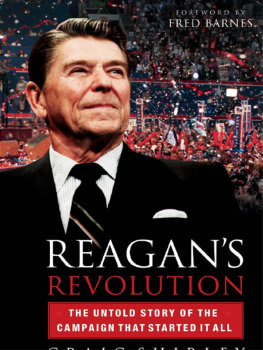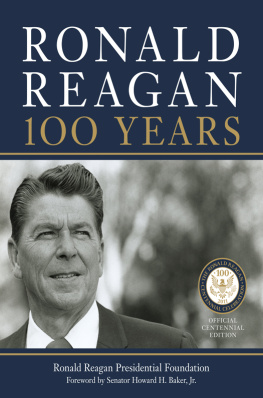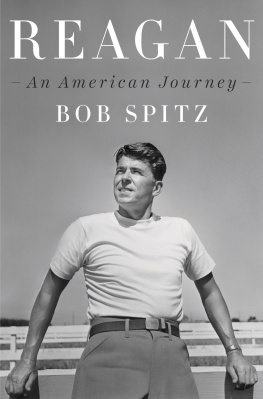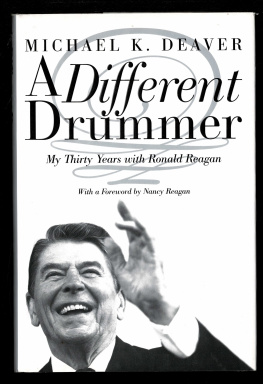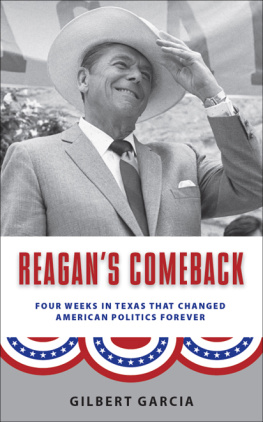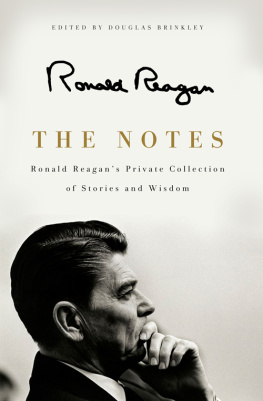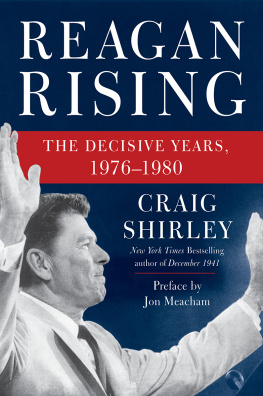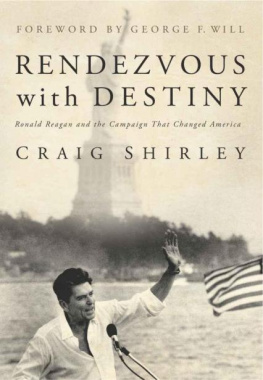REAGANS
REVOLUTION
THE UNTOLD STORY OF THE
CAMPAIGN THAT STARTED IT ALL
CRAIG SHIRLEY
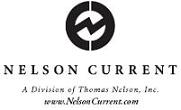
Copyright 2005 by Craig Shirley
All rights reserved. No portion of this book may be reproduced, stored in a retrieval system, or transmitted in any form or by any meanselectronic, mechanical, photocopy, recording, scanning, or otherexcept for brief quotations in critical reviews or articles, without the prior written permission of the publisher.
Quotations from AMERICAN JOURNAL: THE EVENTS OF 1976 by Elizabeth Drew, copyright 1976, 1977 by Elizabeth Drew. Used by permission of Random House, Inc.
Quotations from MARATHON: THE PURSUIT OF THE PRESIDENCY by Jules Witcover, copyright 1977 by Jules Witcover. Used by permission of Viking Penguin, a division of Penguin Group (USA) Inc.
Published in Nashville, Tennessee, by Nelson Current, a subsidiary of Thomas Nelson, Inc.
Nelson Current books may be purchased in bulk for educational, business, fundraising, or sales promotional use. For information, please email SpecialMarkets@ThomasNelson.com.
Library of Congress Cataloging-in-Publication Data
Shirley, Craig.
Reagan's revolution : the untold story of the campaign that started it all / Craig Shirley.
p. cm.
ISBN 0-7852-6049-8
1. PresidentsUnited StatesElection1980. 2. United StatesPolitics and government 19771981. 3. Reagan, Ronald. 4. Political campaignsUnited StatesHistory 20th century. 5. Presidential candidates--United StatesBiography. 6. Presidents United StatesBiography. I. Title.
E875.S46 2005
324.973'0926--dc22
2004026809
Printed in the United States of America
05 06 07 08 09 QW 5 4 3 2 1
CONTENTS
CITIZENS FOR REAGAN
MARTIN ANDERSON: policy advisor
ERNIE ANGELO: Texas Campaign Co-Chairman
RAY BARNHART: Texas Campaign Co-Chairman
JEFF BELL: Research Director
CHARLIE BLACK: Midwest Field Director
MORTON BLACKWELL: state convention tactician; conservative activist
ANDY CARTER: Field Director
RON DEAR: Texas delegates for Reagan Chairman
MICHAEL DEAVER: public relations
DON DEVINE: state convention tactician; conservative activist
BRUCE EBERLE: direct mail strategist
TOM ELLIS: chief political strategist in North Carolina
ARTHUR FINKELSTEIN: North Carolina and Texas tactician
HUGH GREGG: New Hampshire Campaign Chairman and former
Governor
PETER HANNAFORD: public relations
DAVID KEENE: Southern Field Director
JIM LAKE: New Hampshire Campaign Director; Communications
Director
PAUL LAXALT: Nevada Senator; Campaign Chairman
EDWIN MEESE: Kitchen Cabinet; joined campaign, Summer 1976
BILLY MOUNGER: Reagan Chairman, Mississippi
LYN NOFZIGER: Press Secretary; California Campaign Chairman;
Convention Manager
CHARLES PICKERING: incoming State Chairman, Mississippi
CLARKE REED: Mississippi State Republican Chairman
NANCY REYNOLDS: personal advance aide to the Reagans
RICHARD SCHWEIKER: Pennsylvania Senator; running mate
JOHN SEARS: Campaign Manager
LOREN SMITH: General Counsel
ROGER STONE: Youth for Reagan
TOMMY THOMAS: Florida Campaign Chairman
BOB WALKER: campaign strategist; conservative activist
FRANK WHETSTONE: Western Field Director
DICK WIRTHLIN: pollster
CARTER WRENN: North Carolina strategist
PRESIDENT FORD COMMITTEE
JAMES BAKER: Deputy Chairman of Delegate Operations
HOWARD BO CALLAWAY: Campaign Chairman, resigned March 1976
HARRY DENT: senior advisor; Southern strategist
PETER KAYE: Press Secretary, resigned August 1976
DREW LEWIS: Pennsylvania Chairman
ROGERS ROG C.B. MORTON: Campaign Chairman, April to August
1976
BOB MOSBACHER: Finance Director, beginning November 1975
DAVID PACKARD: Finance Director, resigned November 1975
STUART SPENCER: Deputy Chairman for Political Affairs
BOB TEETER: Deputy Chairman for Research
BOB VISSER: General Counsel
CLIFF WHITE: senior advisor
FORD ADMINISTRATION
DICK CHENEY: Deputy Chief of Staff; Chief of Staff, beginning
November 1975
ROBERT HARTMANN: counselor to the President
HENRY KISSINGER: Secretary of State
RON NESSEN: Press Secretary
NELSON ROCKEFELLER: Vice President of the United States
DONALD RUMSFELD: Chief of Staff; Secretary of Defense, beginning
November 1975
CONSERVATIVE AND GOP LEADERS
JIM BUCKLEY: New York Senator; conservative leader
FRANK DONATELLI: Executive Director, Young Americans for Freedom
BARRY GOLDWATER: Arizona Senator, 1964 Republican Presidential
nominee
STAN EVANS: Chairman, American Conservative Union
JESSE HELMS: North Carolina Senator; North Carolina Reagan
Campaign Chairman
EDDIE MAHE: Executive Director, Republican National Committee
RICHARD ROSEY ROSENBAUM: New York State Republican Chairman
MELDRIM THOMSON: New Hampshire Governor; Reagan supporter
RICHARD VIGUERIE: direct mail strategist; conservative activist
JOURNALISTS
FRED BARNES: political reporter, Washington Star
WILLIAM F. BUCKLEY: editor, National Review
LOU CANNON: political reporter, Washington Post
ROWLAND EVANS, BOB NOVAK: syndicated columnists
WILLIAM LOEB: publisher, Manchester Union-Leader
FRANK REYNOLDS: ABC News correspondent
WILLIAM RUSHER: author, The Making of the New Majority Party,
columnist
WILLIAM SAFIRE: columnist, New York Times
JULES WITCOVER: political reporter, Washington Post
GEORGE WILL: syndicated columnist, Newsweek contributor
TOM WINTER, ALLAN RYSKIND: co-editors, Human Events
FOREWORD
by Fred Barnes
T he Presidential race of 1976 brought forth two new political stars, but the press was excited about only one of them. This was Jimmy Carter, the peanut farmer who emerged spectacularly in the Presidential primaries, won the Democratic nomination with ease, and captured the White House by defeating Americas only unelected President, Gerald Ford.
Carter was a Southern pragmatist with moderate to liberal views and a crew of smart, young political advisers. He was seen by reporters and commentators not only as the savior of the Democratic Party, but as a political heavyweight capable of reshaping public policy in creative ways. Carter was the future, the vanguard of a progressive future.
The other star was Ronald Reagan, the former California Governor and conservative whose spirited challenge of Ford for the Republican Presidential nomination was viewed as his swan song. At sixty-five, his political career was over. He represented the past.
Such was the conventional political wisdom in 1976. And seldom has the press been so wrong. True, Carter left his mark on the nation, mostly by weakening it. The economy during his Presidency was beset by a new phenomenon called stagflationhigh inflation and unemployment at the same timethat mystified Carter. And he was unable to slow the march of Soviet Communism around the world. But Carter had a political legacy, an inadvertent one. He paved the way for Ronald Reagan to be elected President and become the most event-making leader of the second half of the twentieth century.
More important, of course, was what Reagan himself achieved in 1976. While losing, he laid the foundation for his successful capture of the Presidency four years later. This is what Craig Shirley explains with such insight and thoroughness in Reagans Revolution. Its a story thats never been fully told before.
Next page
